Introduction
Navigating the complexities of Autism Spectrum Disorder (ASD) can be challenging for any parent, but understanding the condition is the first step towards effective support. Autism Spectrum Disorder encompasses a range of developmental issues that impact social interaction, communication, and behavior. Early recognition of these signs is crucial, as timely diagnosis can lead to more successful interventions.
With the collective efforts of organizations like the Interagency Autism Coordinating Committee (IACC), parents can stay informed about advancements in diagnostic tools and therapeutic methods. This knowledge empowers parents to actively monitor their child's development and seek the necessary assistance to ensure their well-being. The journey may be demanding, but with the right information and resources, parents can make a significant difference in their child's life.
Understanding Autism Spectrum Disorder (ASD)
Autism Spectrum Disorder (ASD) encompasses a variety of developmental conditions marked by difficulties in social interactions, communication, and behaviors. Early recognition of these signs is essential for parents, as prompt diagnosis can lead to more effective interventions. The Interagency Autism Coordinating Committee (IACC) emphasizes the importance of coordinated efforts in autism research and services, involving a diverse group of stakeholders, including parents and advocates. Staying informed about the latest advancements, such as AI-based diagnostic tools and therapy enhancements, can empower parents to better support their offspring's development. Grasping the nuances of ASD allows parents to be proactive in monitoring their offspring's growth and seeking timely assistance.
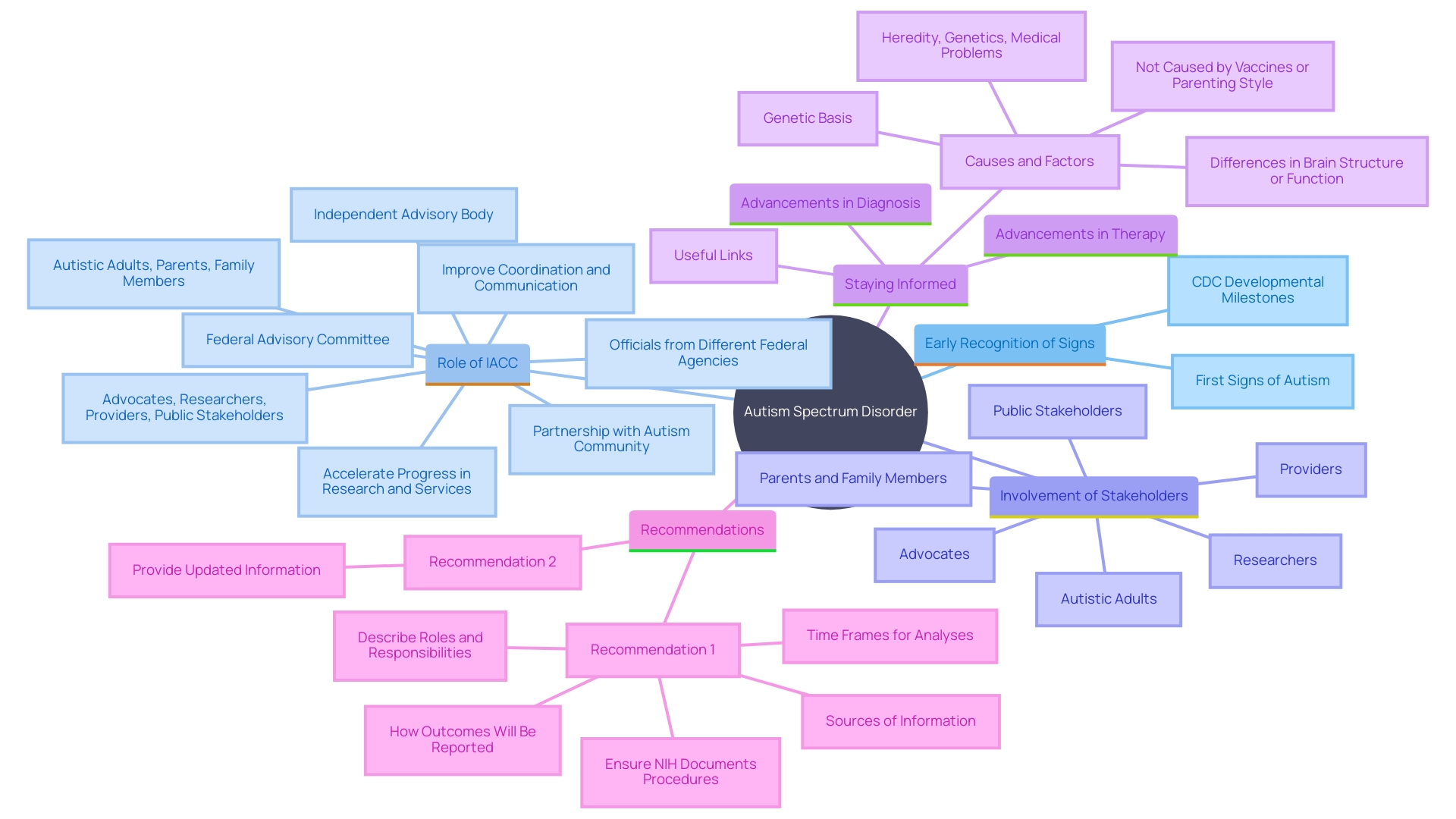
Early Signs of Autism in Infants (6-12 months)
During the first year of life, infants typically reach several developmental milestones that are essential for their growth. Parents should be attentive for signs like limited eye contact and decreased reactions to their name, which can be initial indicators of developmental disorders. Observing a lack of interest in social games and the absence of gestures like pointing or waving can also be significant red flags. Additionally, unusual behaviors like repetitive movements, such as lining up toys or objects and becoming upset when the order is changed, can be telling. These initial signs are crucial for prompt intervention, as swift detection can lead to more effective support and resources, fostering a nurturing environment for the child's development.
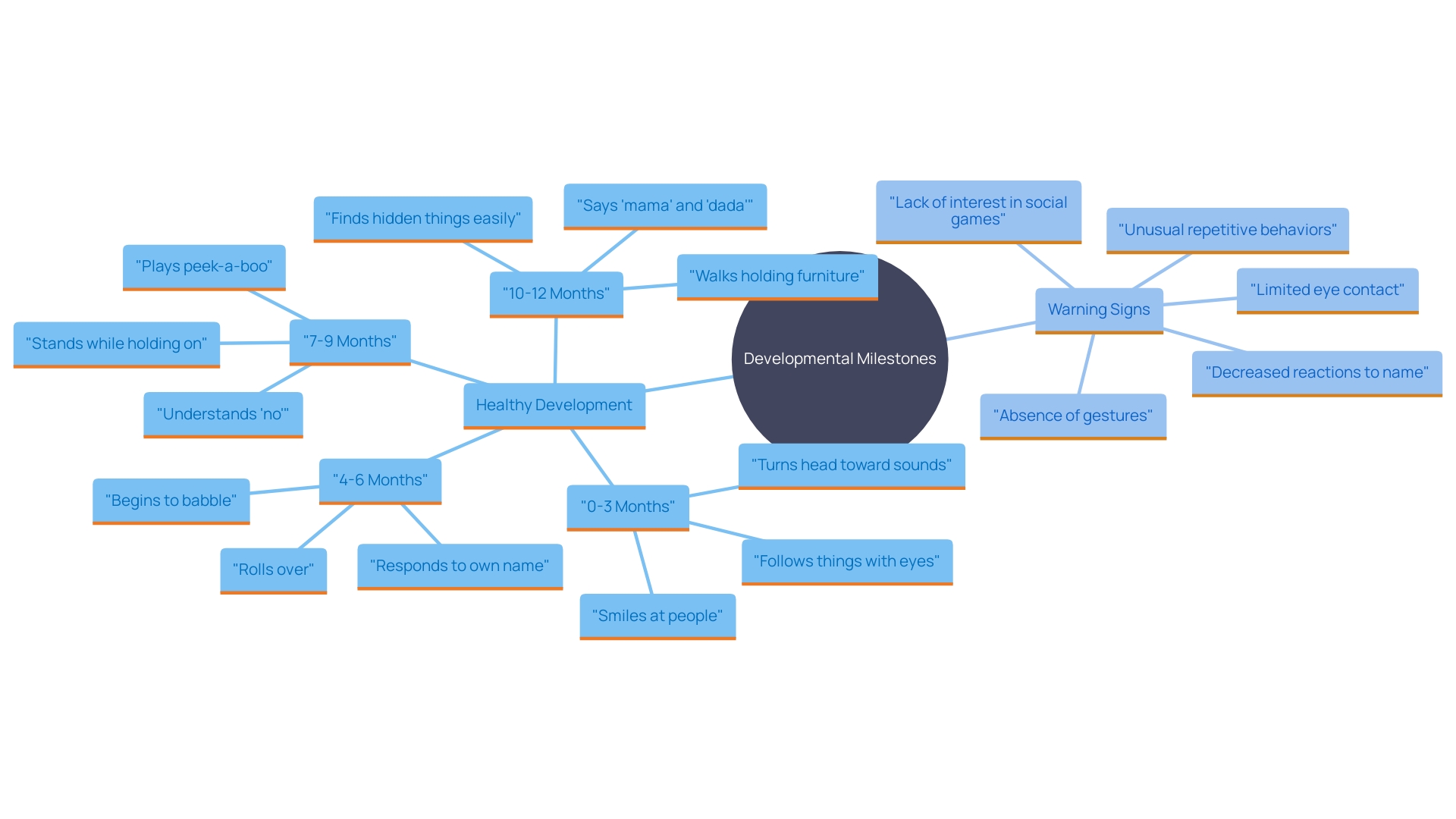
Common Characteristics and Behaviors
Infants demonstrating initial signs of autism may exhibit behaviors that deviate from typical developmental patterns. These can include atypical responses to sensory stimuli, such as indifference to sounds or textures, and a preference for solitary play. Distinguished Professor Linda Smith highlights that visual input for young infants is unique and changes with development, emphasizing the importance of understanding these sensory preferences. Studies show that infants often prefer high-contrast, simple patterns, a difference that caregivers should note. Recognizing these behaviors can help parents identify potential concerns early, ensuring timely and effective support.
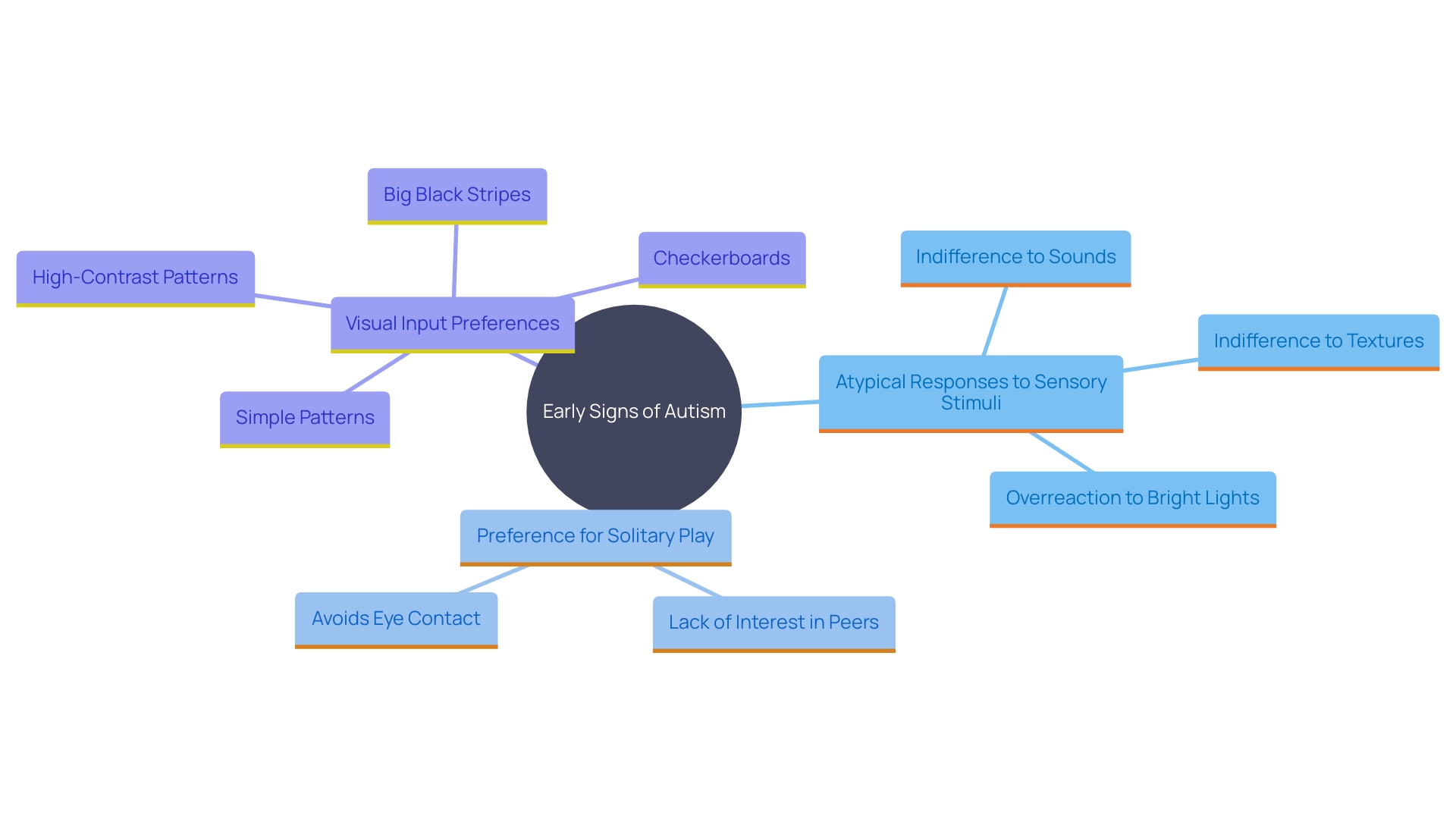
The Importance of Joint Attention
Joint attention is a vital social skill, where two individuals focus together on an object or event. Infants who have difficulty with joint attention might not follow their caregiver's gaze or point to objects of interest. Encouraging joint attention through interactive play is crucial as it enhances communication and connection. For example, using colorful and engaging toys can capture an infant's interest and promote shared focus. As one expert notes, "Clarity is the key ingredient that helps parents feel more confident and calm, and less overwhelmed." This shared experience not only supports social development but also nurtures a deeper connection between parent and offspring.
Language Development and Communication Differences
Language skills are a cornerstone of a child's development. Postponed babbling or a lack of verbal expression in infants can be initial signs of possible difficulties. For instance, infants who do not coo or mimic sounds may be struggling with communication. According to Elika Bergelson, who grew up amid a swirl of Russian, Hebrew, and English, younger minds are actually better at language acquisition, which often leaves adults trailing behind in adapting to new languages. This underscores the importance of early intervention. Bergelson's insights reflect the generational differences in language skills, spotlighting the rapid development that young individuals can achieve. Timely interventions, such as speech therapy or specialized educational programs, can significantly enhance language outcomes, ensuring that youngsters develop strong language abilities vital for their overall growth.
Regression in Skills
Some infants may initially meet developmental milestones but later exhibit a regression in skills, such as a loss of previously acquired social or language abilities. Parents should be vigilant about any sudden changes in behavior or communication, as these shifts could indicate the need for further evaluation. Identifying early indicators is vital as it enables prompt action, which can greatly influence the young person's long-term growth and social involvement. As Dr. David Offord emphasized, ensuring that individuals with disabilities are well-supported in their daily lives is fundamental to their mental health and equitable inclusion in society.
Screening and Diagnosis
Routine pediatric check-ups often include screenings for autism, which are essential for identifying youngsters who may need further evaluation. Early diagnosis has been demonstrated to greatly enhance results, as the Autism Community in Action observes that the sooner treatment such as behavioral therapy starts, the more beneficial it is for the individual. Parents should feel empowered to advocate for their offspring if they notice developmental concerns, and seek referrals to specialists for comprehensive assessments.
The US Preventive Services Task Force highlights the significance of preventive care services, including developmental screenings, to enhance the well-being of young individuals. Participating in these assessments can assist in identifying and managing speech and language delays promptly, which are frequent issues among young individuals with developmental disorders and can result in considerable difficulties in education and social interactions.
Dr. David (Dan) R. Offord emphasized the significance of an equitable beginning for all children, including those with disabilities, which highlights the necessity for prompt and precise screening for developmental conditions. Access to dependable pediatric care, like services provided by Summer Health, which offers 24/7 support through text, can be crucial for parents managing the challenges of diagnosis and treatment.
Moreover, the Interagency Autism Coordinating Committee (IACC) works tirelessly to enhance coordination and communication in research and services related to developmental disorders, advocating for early and accurate diagnostic tools. These efforts help bridge the gap for families, ensuring they receive the support and resources necessary for their offspring's development and well-being.
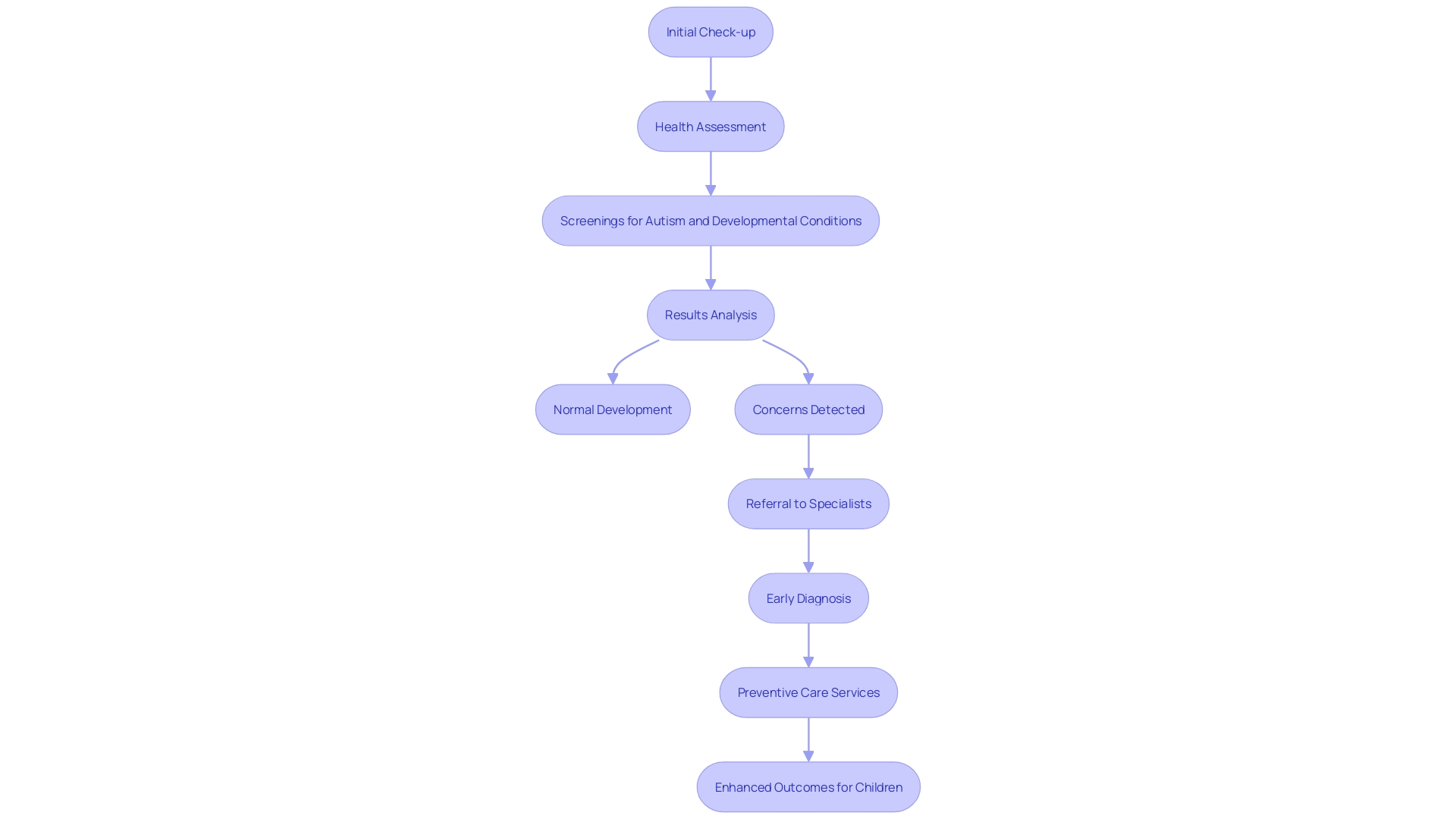
What to Do If You Suspect Autism
If you notice your offspring displaying behaviors that may indicate autism, it's essential to act promptly. Start by documenting specific behaviors and observations, which will be valuable during your consultation with a pediatrician. Prompt action is vital and can greatly improve your offspring's development and quality of life.
Medical interventions, though sometimes challenging to navigate, can make a profound difference. Locating a qualified and experienced physician is crucial to ensuring your offspring receives the best possible care. According to the American Academy of Pediatrics (AAP), a family-centered medical home approach, where the pediatric care team partners with the family, ensures comprehensive and coordinated care. This method focuses on developmental monitoring and screening, identifying children with developmental disorders, and managing their care as a chronic condition.
The Interagency Autism Coordinating Committee (IACC) strives to enhance collaboration and interaction across the federal government and in partnership with the community affected by developmental disorders, including parents and family members. This collaboration aims to accelerate progress in developmental disorder research and services, reflecting the collective expertise of its members.
Remember, behavior is a form of communication. Children with autism may use their behavior to signal medical issues. Coordinated care and services, facilitated by consistent access to high-quality healthcare, are essential for meeting both medical and non-medical needs. By taking these steps, you can provide your child with the support and resources they need for a brighter future.
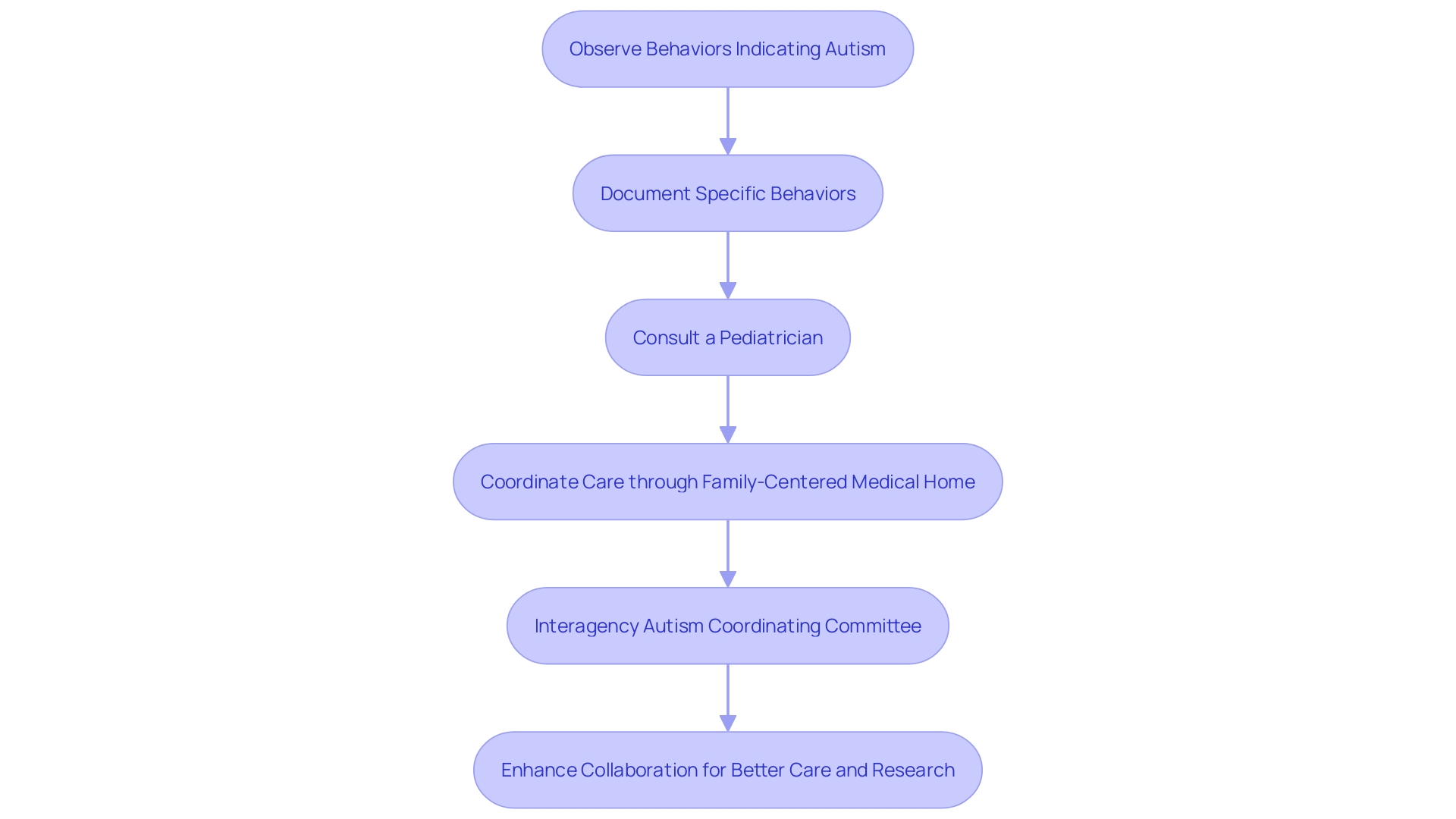
Conclusion
Understanding Autism Spectrum Disorder (ASD) is a journey that requires vigilance, knowledge, and proactive engagement from parents. Recognizing early signs, such as limited eye contact or delays in language development, can significantly influence a child's trajectory. The importance of early diagnosis cannot be overstated; timely intervention often leads to better outcomes and enhances the overall well-being of the child.
Through a comprehensive understanding of ASD characteristics, parents can identify potential concerns and take appropriate action. Encouraging joint attention and fostering communication skills are essential steps in nurturing a child's social development. Moreover, being attuned to any regression in skills is crucial, as these changes can indicate the need for further evaluation and support.
Engaging in routine screenings and seeking referrals for specialized assessments empower parents to advocate effectively for their child's needs. The collaborative efforts of organizations like the Interagency Autism Coordinating Committee (IACC) highlight the significance of coordinated care in autism research and services. By embracing these resources and strategies, parents can ensure that their children receive the necessary care, fostering a supportive environment that promotes growth and development.
Ultimately, the journey may present challenges, but with the right information and a proactive approach, parents can make a meaningful difference in their child's life. Understanding and advocacy are key to navigating the complexities of ASD, paving the way for a brighter future filled with opportunities for all children.




